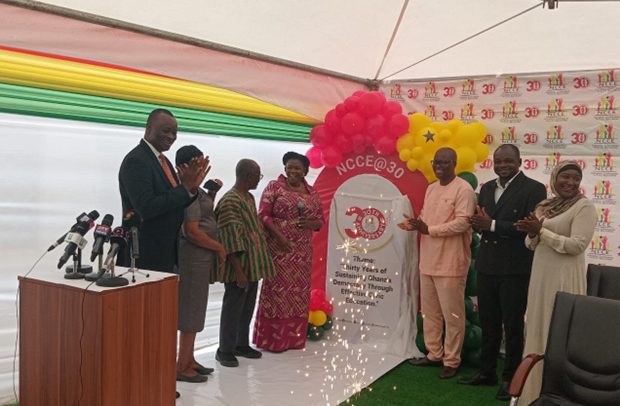Key partners launching the anniversary celebration
Chairperson of the National Commission for Civic Education (NCCE), Kathleen Addy, has cautioned the public and political candidates against the monetization of politics through acts of vote buying and selling as it poses serious threat to the practice of democracy in the country.
According to the Chairperson, the act of political parties and candidates distributing money to voters in order to influence their voting ties during elections has grown stronger over the years.
She stressed that the inability of most voters to fight against this act has had negative implications on democracy in the country as the money given is not for free. She said the giver of the money would be expecting to take leadership role and if that is not successful, the candidate will come back to account for their money.
She highlighted that the conditionality of the act has not only made it dangerous as the money will be accounted for but has also given the impression that democracy can be bought in the country.
The Chairperson therefore called on the public to desist from accepting money from political candidates and parties as this will strengthen the practice of the country’s democracy.
“A threat to democracy I would like to highlight is the monetization of politics. This is dangerous because every cedi and pesewa that is used in our electoral process comes from some place. To use so much money during elections gives the impression of ‘democracy for sale’ which is very dangerous for the entrenchment of our democracy so we have to be very careful,” she said.
“We have to, as a people; take the bull by the horns and address this issue that continues to plague us. It is a dicey issue to talk about but we all know is there and we must all be part of the conversation to ensure that this culture does not stay,” she added.
She shared this at the launch of the NCCE’s 30th anniversary celebration under the theme, ‘Thirty Years of Sustaining Ghana’s Democracy through Effective Civic Education.’
The year-long anniversary celebration will include panel discussions with statesmen on the role of Independent Government Institutions (IGIs) in sustaining democracy, visits to the arms of government, civic awards to recognise patriotic citizens and national builders as well as other activities.
A representative of the Commission on Human Rights and Administrative Justice (GHRAJ), Stephen Azantilow, expressed his institution’s appreciation for the NCCE’s support over the years.
“On this occasion, I would like to say that the history of CHRAJ cannot be written without NCCE and we are very proud that they are celebrating their 30th anniversary as their existence has assisted us to protect the fundamental human rights, insist on accountability, and the respect for democracy in Ghana,” he shared.
By Abigail Atinuke Seyram Adeyemi

